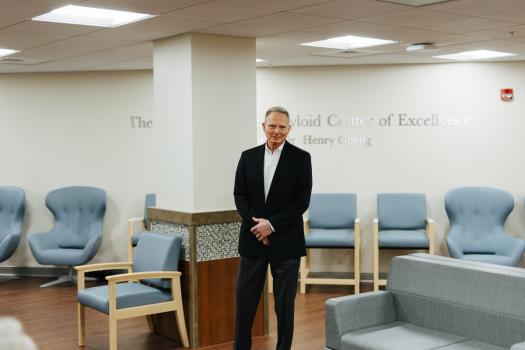
Robert Martin, of Sarasota, Fl., speaks at the grand opening of the Martin Cardiac Amyloid Center of Excellence at The Chattanooga Heart Institute. Mr. Martin donated $2.5 million to help make the center a reality.
The Chattanooga Heart Institute announces the opening of its new Martin Cardiac Amyloidosis Center of Excellence in honor of Dr. Henry Cheng, the first of its kind in the region. This specialized center will provide comprehensive diagnosis, treatment and management for patients with cardiac amyloidosis, a disease characterized by the buildup of abnormal protein deposits in the heart.
Officials said, "Cardiac amyloidosis often goes undiagnosed due to its slow progression and nonspecific symptoms, which can mimic other common conditions.
Amyloidosis often starts with joint issues and progresses to further decline in functional ability. The Chattanooga Heart Institute’s new center aims to address the challenge of undiagnosed cardiac amyloidosis by raising awareness, facilitating early detection, and offering advanced treatment options."
"Early detection of cardiac amyloidosis significantly improves outcomes," said Dr. Cheng, The Chattanooga Heart Institute’s Cardiac Amyloidosis Center director. "By identifying the disease in its early stages, we can implement treatment strategies to slow its progression and prevent further damage to the heart."
The center will utilize advanced diagnostic tools, including the Technetium-99m Pyrophosphate (PYP) scan, a nuclear scan that can show if something is going on with internal organs because of amyloidosis. The center will also offer genetic testing for patients and their families to determine if there is a genetic predisposition to the condition.
"We are committed to expanding the comprehensive cardiac care available to our community," said William Warren, MD, managing partner at The Chattanooga Heart Institute. "This new center allows us to provide specialized care for patients with cardiac amyloidosis, improving their quality of life and overall outcomes."
"While there's currently no cure for amyloidosis, early diagnosis and treatment - including oral medications to stabilize proteins and injectables to suppress protein production in the liver - can significantly improve patient outcomes," officials said. "Individuals experiencing persistent or unexplained health issues are encouraged to consult with their health care provider for evaluation."
The establishment of the Cardiac Amyloidosis Center at The Chattanooga Heart Institute was made possible through a donation to CHI Memorial Foundation’s Invest in the Best campaign.
"Robert Martin’s extraordinary generosity through a $2.5M gift has made this center a reality," said Jennifer Nicely, CHI Memorial Foundation president. "His commitment to advancing cardiac care in our community will have a lasting impact on the lives of countless patients and families. Additionally, The Kennedy Family Foundation committed $1M to this project and a number of other donors made five and six figure gifts.”
"The Cardiac Amyloidosis Center is one of six projects funded through the CHI Memorial Foundation’s ongoing $21M Invest in the Best Capital Campaign effort focused on bringing advanced technology and medical care to our community," officials said. "The multi-million dollar initiative aims to expand and enhance patient care across a range of critical specialties. The campaign focuses on five key areas: cardiac care, emergency services, interventional pulmonology, stroke and neuroscience and oncology. Hospital leadership and community leaders have already raised more than $14.8 million of the $20.65 million goal, including seven lead gifts of $1 million or more."

Dr. Henry Cheng, The Chattanooga Heart Institute’s Cardiac Amyloidosis Center director, explains the impact the center will have on the Chattanooga community during the grand opening ceremony.